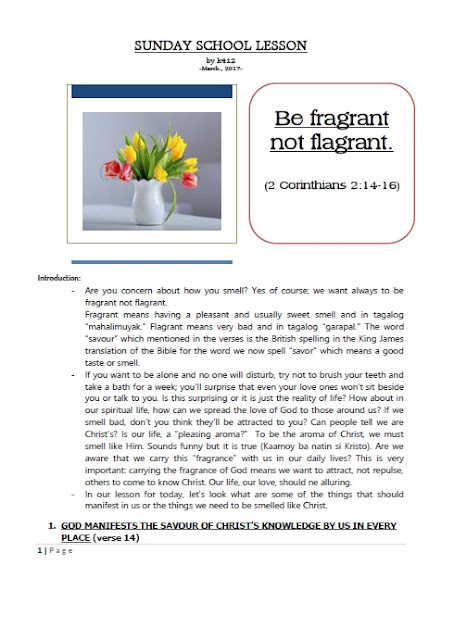FALLEN CROWN
LAMENTATION
5: 1-22; DANIEL 4: 28 – 37
April
15, 2018
Lesson
Prepared by: krisha of Solomon Wisdom FB page
MEMORY
VERSE
“The crown is
fallen from our
head: woe unto us, that we have sinned!” - LAMENTATION 5:16 -
Our topic for this month is about
revival and like what I had said before, that was last year, reviving a person
to come back to life is very hard. Personally, I saw with my two eyes how
process of
revival in a hospital was; seeing it with my own niece and sad to say, she was
not revived. How about our spiritual life? Let’s try to think a life without
God’s presence and it’s like a life without church, Christian friends, Bible,
fellowships and other spiritual things. The manifestations that you need
revival are evident but how about the situation wherein you are still
surrounded by spiritual things but deep inside you need revival. What are the
simple things you see and feel in you that you need revival? (Allow responses).
With my own experiences, I didn’t read the Bible, no quiet time, no application
of God’s word and my works in the ministry was like a routine. Other Christians
I had heard their testimonies and they said they felt their hearts were full of
pride. These things happen not suddenly; it’s step by step. For worst,
sometimes God allows us to experience to lose things which are dear or
important to us so that we may realize that we can’t live without Him. The
title of our lesson for today is “FALLEN CROWN.”
What is fallen crown? According to Barnes’ notes on the
Bible, literally “the crown of our head is fallen,” what was our chief ornament
and dignity is lost; the independence of the nation, and all that gave them
rank and honor. This meaning of crown happens in our life if our spiritual
desolation is getting worst.
Let’s try to personalize the real experiences of Jerusalem
without the presence of the Lord. In lamentation chapter 5, we read about
Jeremiah’s concern and agony for Jerusalem. In verses 1-8, they experienced great misery
(depression/desolation): their inheritance and houses have been turned to other
countries, they became orphans and waifs (homeless), mothers became widows, their
water and wood which were supposed for free, they paid for these. they became
beggars, became servants of servants and none to deliver them from their land.
In the next verses, there are more miseries mentioned. They risked their lives
in getting food, no nourishment received by the bodies; the bible says, “our
skin is hot as an oven.” The maidens were raped, their princes’ hands were hung
up, elders were not respected, and young men labored above they can be able.
And because of these miseries, the elders stopped gathering at the gate (no
elders meeting), young men stopped singing and playing instruments, their joy
ceased, their dance turned to mourning, their hearts fainted, their eyes
dimmed, and they stopped going to the temple. Then the crown has fallen from
their head. Maybe you would say, “This would not happen to me.” This maybe
worst compare to the possibility of our misery but remember nothing would be
compared to the life without the Lord because it is a great desolation whether
it’s only simple or complicated misery. Let’s watch our hearts because we may
surprise one day that our crown is fallen, our Christian dignity is lost. There
are points we should consider:
LESSON
OUTLINE:
1) REMEMBER KNOWLEDGE ABOUT GOD IS NOT ENOUGH (DANIEL 4: 1-4)
-
From
the previous chapters, King Nebuchadnezzar saw that the God of Shadrach,
Meshach and Abednego was faithful; He could rescue His people. He also saw that
the Lord would step into a blazing furnace to be with those who trust Him. All
of these were steps toward knowing God, but he needed to learn something. This
chapter is a letter of King Nebuchadnezzar to everyone in the entire world. In
first three verses, he had spoken higher praise to God but in his heart, he had
that pride which led him to destruction. In Daniel 4:30, he didn’t acknowledge
God in his endeavors and success.
-
There
are tendencies for believers who have been in the ministry for so long to take
the ministry’s successfulness because of their experiences. And this will start
to root in their hearts and become pride.
-
Remember
knowledge about Bible is not enough and this is sometimes also to lead you to
become boastful especially those leaders, teachers, bible school students and
knowledgeable of God’s Word.
-
This
point number one is also applied for some members who have few knowledges about
the Bible but no application in their lives.
-
Sometimes
we are like King Nebuchadnezzar, we don’t trust God in our lives; we decide for
ourselves. It seems like God is not in control of everything.
-
Nebuchadnezzar’s
sins were very much like those of Pharaoh in Egypt and the Pharisees in Jesus’
day. All of these men were puffed up with pride, and they mistreated the lowly
(Exodus
1:11, 5:2; Matthew 23). Pride was
the very sin of Satan (Ezekiel 28:15-17). C.S.
Lewis writes, “The essential vice, the utmost evil, is pride. Unchastity,
anger, greed, drunkenness, and all that, are mere fleabites in comparison: it
was through Pride that the devil became the devil: Pride leads to every other
vice: it is the complete anti-God state of mind.” It is no wonder that God
detests pride and opposes the proud (James 4:6, Proverbs
6:16-17). It is
pride that leads men to believe we can live without Him. https://bible.org/seriespage/9-god-humbles-nebuchadnezzar-daniel-4
The king spake, and said, “Is not this great Babylon, that I
have built for the house of the kingdom by the might of my
power, and for the honour of my majesty is.” (Daniel
4:30)
-
There
is a word that comes to mind. It is P-R-I-D-E. Pride is thinking too highly of
oneself. Nebuchadnezzar thought that he had
built the kingdom. In truth, God was the one who handed all of his prisoners
over to him (Daniel
1:2). When Daniel interpreted his first dream, he said, “The God of heaven has given you authority and
power. He has given you might and glory.” (Daniel
2:37) Pride makes us think that we do not need God. Pride
separates us from God. Nebuchadnezzar did not give credit to his Creator, and
His Creator had had enough. https://bible.org/seriespage/9-god-humbles-nebuchadnezzar-daniel-4
-
God’s
word tells us that God stands against those who are proud (James
4:6). If we are proud of our own talents or abilities,
looks or possessions, God may take those things away so we will see what is
true - God is the One who gives every good thing that we have (James
1:17). Without God we are helpless. We should never brag
about what we have accomplished (1
Corinthians 5:6). The only thing we should ever brag
about is that we know the Lord! (Jeremiah 9:24) https://bible.org/seriespage/9-god-humbles-nebuchadnezzar-daniel-4
2) PAY ATTENTION TO GOD’S WARNINGS (DANIEL 4:27, 30)
-
God
had warned Nebuchadnezzar and had been very patient with him. But finally, the
prediction came true. All of the things that he was so proud of were taken
away. Remember the fine food at the King’s table that we read about in Daniel
1? That was taken from Nebuchadnezzar; he had to eat
grass just like the goats and cows! He was used to living in a grand palace,
but now he had no shelter over his head. For 7 years, the great King
Nebuchadnezzar lived out in the wilderness like an animal. He lost his mind; he
became crazy (Daniel
4:34). Without God, he was helpless. https://bible.org/seriespage/9-god-humbles-nebuchadnezzar-daniel-4
-
God
wants us to stay close to Him and far from sin. When we are in sin, or close to
things that tempt us, God gives us correction in several ways. He instructs us
in His word (2
Timothy 3:16), through Bible teaching, and preaching (Matthew
12:41). He speaks to us through prayer (Daniel
9:20-22). Often, He also uses those close to us - our
parents, teachers, and friends - to let us know when we are making wrong decisions
(Proverbs
13:1, 2 Samuel 12:9). It is so
important for us to pay attention to God’s correction. God is patient, but when
we choose to ignore His loving warnings, we will face the consequences of our
sin (Proverbs
1:24-33). https://bible.org/seriespage/9-god-humbles-nebuchadnezzar-daniel-4
-
3) CHANGE YOUR FOCUS (DANIEL 4:34- 37)
-
After
seven years of living like an animal, Nebuchadnezzar finally looked to God.
Nebuchadnezzar changed his focus from himself to the one true God who deserved
to be worshipped and praised. He turned from his pride and became humble. Right
away, his mind was made right. God forgave Nebuchadnezzar and returned all that
he had lost, plus a lot more.
Proud people want to hide their
mistakes so other people won’t know that they have faults. Humble people admit
when they make mistakes. Nebuchadnezzar showed that he became humble when he
admitted his sin of pride in this letter that he wrote for the entire world to
read. He also used the letter to praise God and declare that God was in control
of everything.
We should notice that God brought
Nebuchadnezzar low for his GOOD, not for his destruction. It was far more
important for Nebuchadnezzar to know the one true God, and enter into God’s
eternal Kingdom, than for him to live a carefree life on earth and die without
knowing God.
CONCLUSION:
-
You
may feel for now that you would not come to that point of your life like
Nebuchadnezzar’s feelings and pride, but this is real possible for everyone
because the Bible says, “Wherefore let him that thinketh he standeth take heed
lest ye fall” (1 Cor. 10:12). Therefore, let’s continue watch ourselves let’s
do prevention. But if we are now on the first step of falling don’t wait for
years to change your focus and look to God.
Nebuchadnezzar lived 7 seven years like an animal before he finally
looked up toward heaven.
-
In
Lamentations 5: 21 says, “Turn thou us unto thee, O LORD, and we shall be
turned; renew our days as of old.” Jeremiah’s desire to turn His people to God;
he prayed for restoration.




























